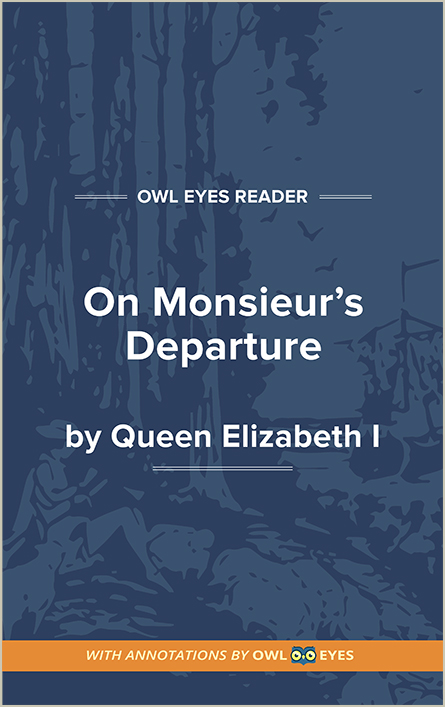- Annotated Full Text
- Literary Period: Renaissance
- Publication Date: 1582
- Flesch-Kincaid Level: 8
- Approx. Reading Time: 0 minutes
On Monsieur's Departure
“On Monsieur's Departure” has been attributed to Queen Elizabeth I, who ruled England from 1558 to 1603. She studied widely for a woman for her time, spoke five languages fluently, and penned many of her own speeches. As a female sovereign in an era of aggressive patriarchies, Elizabeth’s role as queen was tricky. To maintain her political power she rose above conventional perceptions of women and adopted many male attributes. Her most effective rhetorical move to this end was her creation of the “Cult of the Virgin Queen.” Elizabeth refused to take a husband and even encouraged her courtiers and advisors to address her in extravagant terms that likened her to a goddess and paragon. “On Monsieur’s Departure” offers a view into the Queen’s interior life, revealing a self that contradicts the persona she presented to the world. The Queen may have kept the poem to herself, for it was discovered by auditors amongst her private papers after her death. The title, which was added in a 17th-century manuscript, suggests that the subject of the poem is Elizabeth’s failed engagement to the French Duke of Anjou. Though she seems to have loved the prince, their differences were problematic. She was 46; he was 24. She was Protestant; he was Catholic. Elizabeth was also too old to bear a child, making marriage unnecessary. All of this led to the end of the engagement in 1581. This poem’s poignant metaphors and halting lines reveal a woman mourning the loss of her love and struggling to express her complex feelings. We see a queen caught between the external demands of her public life and the internal need to process her sorrow. We see, too, the universal plight of a human caught in a powerful storm of mixed thoughts and emotions.
- Annotated Full Text
- Literary Period: Renaissance
- Publication Date: 1582
- Flesch-Kincaid Level: 8
- Approx. Reading Time: 0 minutes

